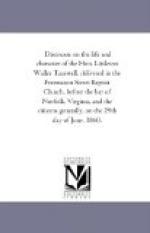One of the obvious results of the peace of 1815 with Great Britain was the active employment of our commercial marine. During the war the seeds of new enterprises had been sown, and much of that capital which had previously been employed in navigation had been diverted, and fresh capital was required in its place. There was a general desire for the creation of new banks; and as the principles of banking, which have become more familiar since, were in 1816 comparatively unknown to those who composed a majority of the assembly, it was important that Norfolk should be ably represented in the assembly. At this time the existing banks, which had suspended during the war, had not resumed the payment of specie. On the subject of banks, Tazewell though brought up by men who had been almost ruined by a paper currency and hated the name, his own father having been one of the most active statesmen in forcing a resumption of specie payments after the peace of 1783, was not unwilling that commercial men should employ the agency of banks under proper restrictions; and having been elected by the people of Norfolk to the House of Delegates without his knowledge and during his absence from home, he took his seat in that body in 1816. Let it be remembered, that when he took this trust from the people of Norfolk, he was constantly engaged in the highest duties of his profession; that he was not only employed in courts, but was consulted by foreign clients—by the merchants of London and by the Court of Rome; and that his absence from town in the performance of his duties in the assembly would result in the loss of thousands at a time when he was far from being a wealthy man; and we will have some idea of the principles which guided his conduct in respect of the public service. He sought nothing—he asked nothing from public bodies or from the people, but he recognized the obligation resting on every citizen to serve his country; and when an emergent case occurred, and he was called out by the people, he never declined office, but entered into it at every personal sacrifice, performing its duties with such success and such ability as to leave an impression upon the times in which he lived.[8] He practically defeated the wild banking schemes of the session by the insertion of a specie clause which was readily adopted by the friends of those measures, but which, as was designed, made their schemes impracticable.
But his great effort in the assembly of 1816 was his speech on the Convention bill of that year. He spoke in reply to the late Gen. Smythe of Wythe; and in an argument of uncommon power, which formed one of the eloquent traditions of the House when I took my seat in it twelve years later, he answered the objections urged against the existing constitution, and sustained that instrument in all its length and breadth. His speech produced a wonderful effect upon all who heard it. The late Philip Doddridge, one of the ablest and most decided of all Mr. Tazewell’s




